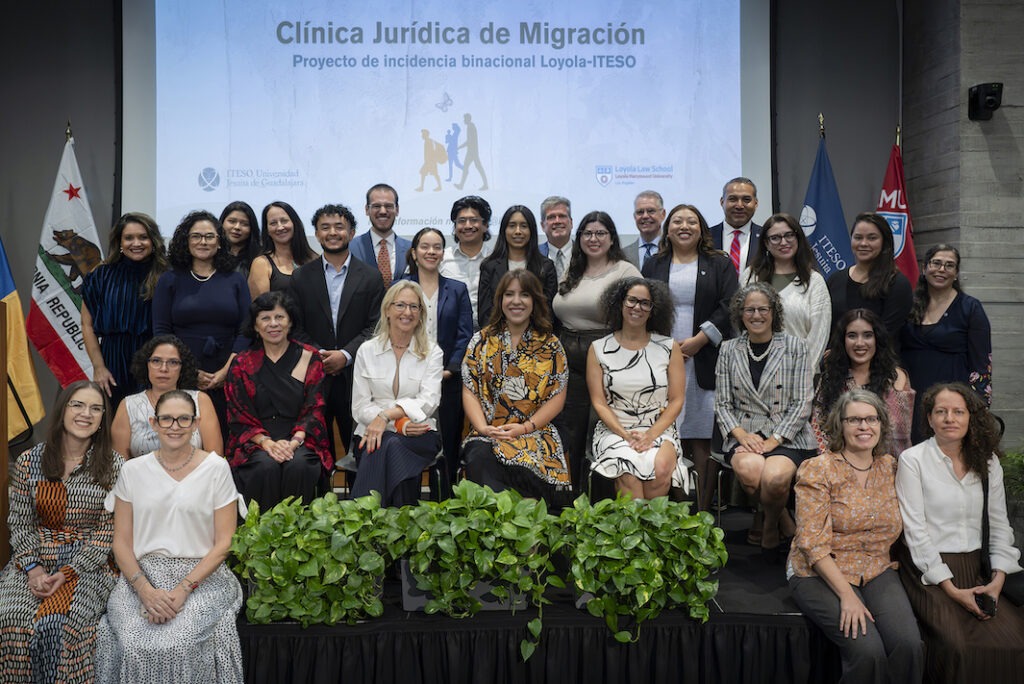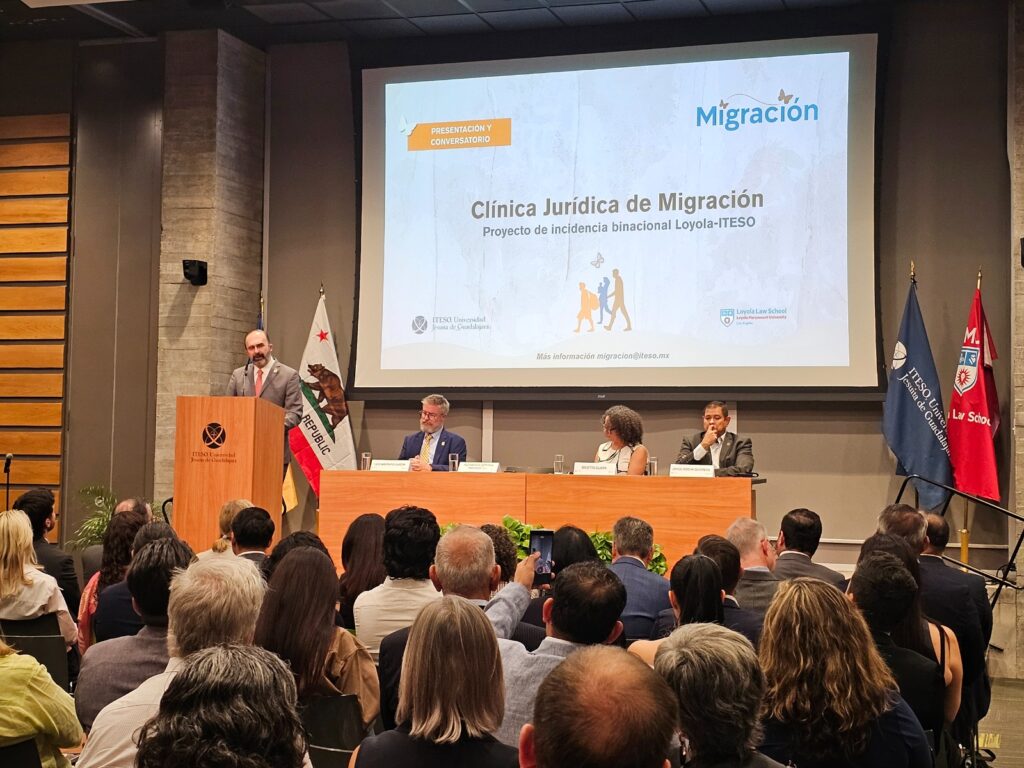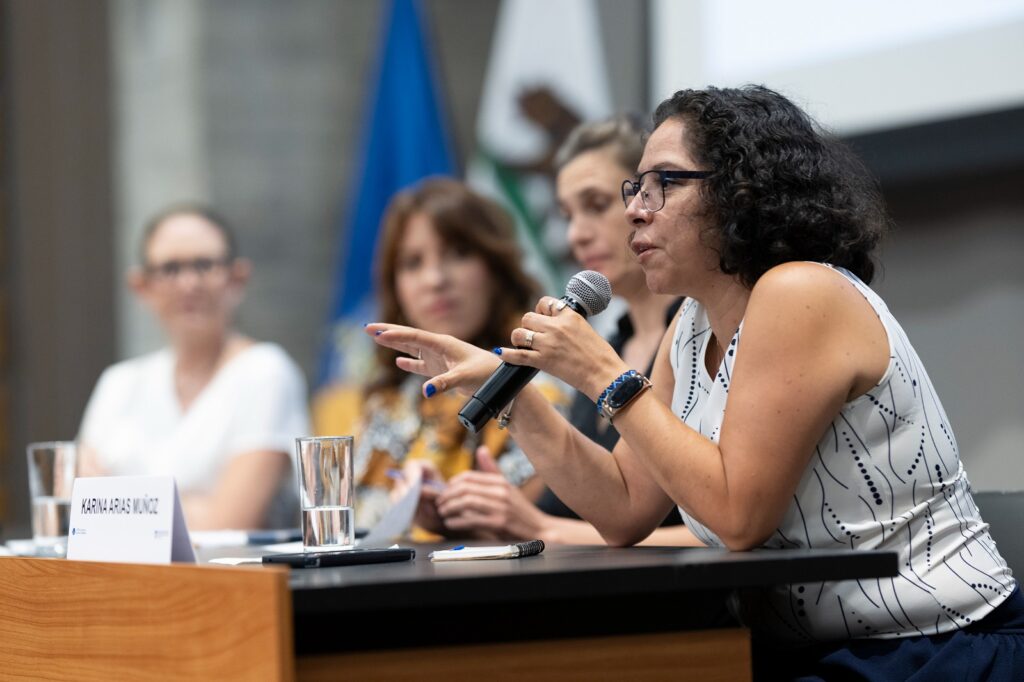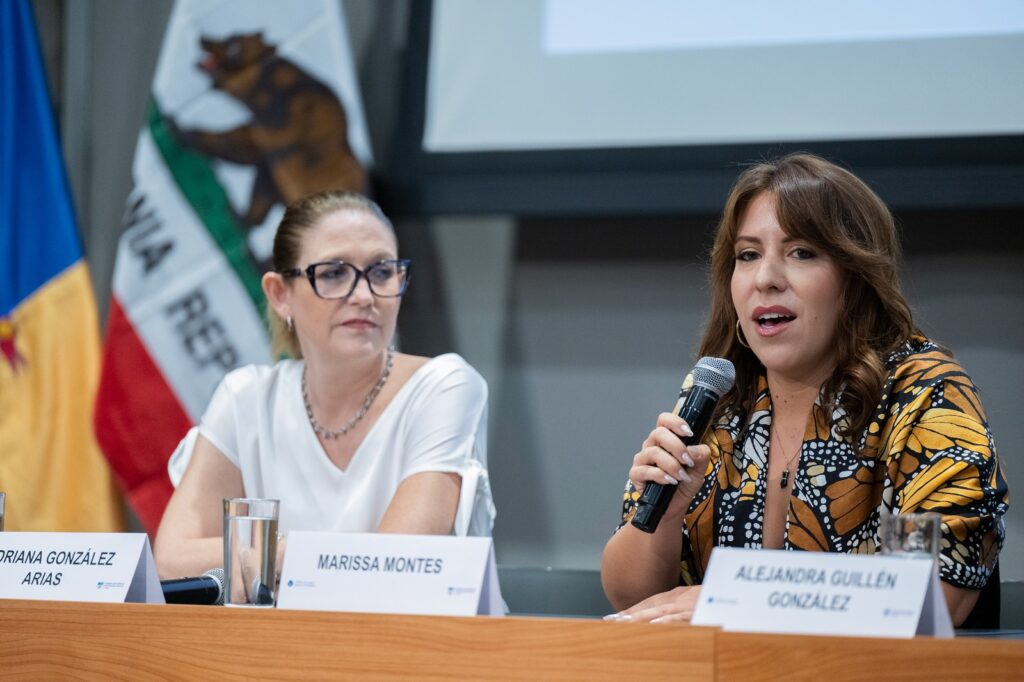The auditorium at the ITESO university was filled to capacity on the evening of September 2 as students, faculty, civil society leaders, and an international delegation from Loyola Marymount University gathered for the inauguration of Guadalajara’s new Clínica Jurídica de Migración Binacional (Binational Migration Legal Clinic). Applause broke out again and again as speakers underscored both the urgency of the moment and the hope embodied in this innovative cross-border initiative.
At the center of the stage, co-founder, former immigrant and Guadalajara native, now a law professor at Loyola, Marissa Montes stood out in a flowing blouse adorned with monarch butterflies — a quiet nod to the symbol of resilience and migration that would surface throughout the evening.
Para leer este artículo en español ver La Clínica Jurídica Binacional despega en el ITESO

An urgent context
ITESO (Instituto Tecnológico y de Estudios Superiores de Occidente) Rector Alexander Zatyrka framed the project against the global and national crises of migration.
“In the last decade, there has been a drastic increase in migration flows around the world, driven by multiple factors such as poverty, the rise in conflicts and violence, political and economic instability, as well as the impact of climate change and natural disasters,” he said.
He noted that in 2024, more than 83 million people were displaced worldwide, nearly 9,000 of them dying along migration routes.
“What should be a journey towards dignity often becomes a journey of suffering, danger and even death,” he said, stressing that Mexico has seen many such tragedies unfold. For those who survive, the journey often ends in persecution, detention, and expulsion amid rising xenophobia worldwide.
Against that backdrop, he explained, the new clinic will offer representation and support to deportees, returnees, asylum-seekers, and refugees in the Guadalajara metropolitan area, while serving as a training ground for students: “A place where they find hospitality, comfort and hope.”
The clinic will be housed at Casa ITESO Madero, located at Francisco I. Madero 836, just half a block from the Templo Expiatorio. The space is also home to the University Center for Dignity and Justice Francisco Suárez.

U.S.-Mexico collaboration
The Binational Migrant Legal Clinic is the first clinic jointly operated by a Mexican and a U.S. law school. Brietta Clark, dean of Loyola Marymount University’s law school, outlined the clinic’s mission as threefold: to provide direct support to migrants, deportees, and returnees; to help shape policies that move toward a more just system of human mobility; and to cultivate new generations of binational leaders committed to dignity and human rights.
“It’s a model that other universities are already replicating, and it’s very important at a time when human rights and mobility are under attack,” Clark said.
The symbolism of the moment was not lost on anyone. In fact, one Loyola speaker joked that the launch felt like a wedding — formalizing a long courtship between two Jesuit universities that had already collaborated for years on immigration service projects.
Immigrant experience
For Montes, who co-founded Loyola’s clinic in Los Angeles in 2012, the binational project is deeply personal. Born in Guadalajara, she migrated as a child with her family and returned to the city only decades later. She recalled that her own family found no support from governments or institutions when they crossed into the United States. “It was the immigrant community,” she said, that provided the assistance they needed to survive.
That experience has shaped her philosophy of “community-based lawyering.”
“What we did was work with them,” Montes said. “The community defines the goals.”
She told the packed auditorium: “Even though I am a migrant, I am an extremely privileged migrant … I don’t feel Mexican, nor do I feel American, but that’s because I am part of that community, and there is no other community I want to be part of.”

Stories that cross borders
Several cases described during the event illustrated what this approach looks like in practice. Montes recounted the story of a 14-year-old Venezuelan girl identified in Jalisco while in transit. The clinic worked to secure her a Mexican visa, preventing deportation and stabilizing her legal situation. That in turn opened the way for Loyola students in the U.S. to represent her case, gaining her legal entry and reuniting her with her family there.
Another example involved DACA recipients — “Dreamers.” Through the Advance Parole program, Loyola and ITESO students supported young people in making temporary return trips to Guadalajara, often their first time back. These trips not only allowed them to reconnect with their homeland but also “cured” their immigration status, paving the way for permanent residency. Montes recalled representing one such client at a green card interview — surrounded by four of her former law students, now practicing immigration lawyers.
“This is the purpose of clinical education,” she said, “to train lawyers for others.”
From dream to reality
Adriana González Arias, professor and researcher, said the dream of having a legal clinic at ITESO dates back eight or nine years. She and colleagues began by designing courses on migration and asylum, bringing in civil society partners like Guadalajara’s FM4 Paso Libre and the UN Refugee Agency (UNHCR). As cases multiplied — from returnees unable to obtain birth certificates to migrants facing housing discrimination — the need for a dedicated clinic became clear.
Beyond its direct services, the clinic is transforming legal education. ITESO has created its first-ever required immigration law course for law students, while also opening opportunities for students from other fields — from political science to computer science — to contribute.

A model for replication
As the evening drew to a close, Montes reiterated that the clinic was not meant to be unique. Already, other universities in Mexico and the U.S. have expressed interest in replicating the model. The goal is to link communities across diasporas: Puebla with Pennsylvania, San Luis Potosí with Chicago, Oaxaca with New York.
Or, as she put it in the video that ended the ceremony: “Like butterflies, we cross borders.”
The enthusiastic applause that followed suggested that many in the auditorium — students, professors, and community advocates alike — were ready to take flight with her.
This story was originally published in The Guadalajara Reporter.net and is reposted here with permission.
Clínica Jurídica de Migración Binacional ITESO Loyola Marymount University
thank you y gracias por otra mensage de esperanza in an epoch that again and again challenges ones hopes
Thank you, Susan. It’s so true. And I find that putting the focus on those who are doing the work is really helpful on so many levels. Thank you for reading and for caring. Let’s keep Esperanza alive.
Such a great story, Tracy. Yes, I know that place just off the plaza near your home. I’ve walked past that place so many times. All of this is so sensible, and so encouraging – but not terribly surprising. Thank you!!
Thank you for reading and for caring, Toni. Complicated times we’re living in … but good to know there are people working diligently and capably to make a difference.